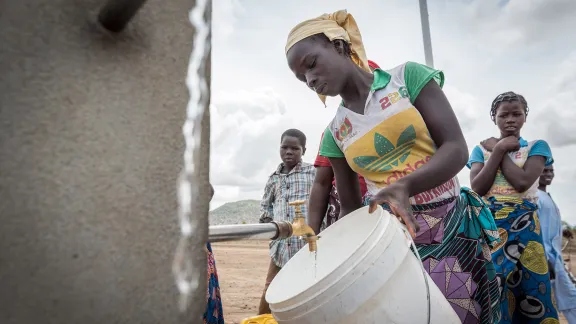
For the most vulnerable people access to sufficient and clean water is essential at times of climate change as well as during the Coronavirus disease (COVID-19) pandemic. In Minawao camp, a young woman waits for her bucket to fill up at one of the tapstands. The Minawao camp for Nigerian refugees, located in the North region of Cameroon, hosts some 58,000 refugees from North East Nigeria. The refugees are supported by the Lutheran World Federation, together with a range of partners. Photo: LWF/A
LWF and interfaith partners call for sustainable, just and healthy societies
(LWI) - Observing today’s Earth Day, the Lutheran World Federation (LWF), together with other inter-faith groups active at United Nations Framework Convention on Climate Change (UNFCCC) conferences has issued a statement. It calls on the UNFCCC, all governments, and all people, to build sustainable, just and healthy societies that are “resilient in times of crises such as COVID-19 and climate change, and to act early enough to prevent greater hardship and suffering in the future.”
In the light of the indefinite postponement of COP26 due to the Coronavirus disease (COVID-19) pandemic, the statement calls “all stakeholders to not delay ambitious and urgent climate action.” COP26 was initially scheduled to take place in Glasgow, United Kingdom, in November.
“2020 is a key year for the review of climate policies,” explains Elena Cedillo, LWF Program Executive for Climate Justice. So far, three governments had submitted their second nationally determined contributions (NDCs). NDC are the reductions in greenhouse gas emissions governments commit to under the UNFCCC. “Governments must deliver on their commitment to revise their NDCs and, most important, they must increase their concrete contributions to avoid an even more severe climate crisis,” Cedillo urges.
“The COVID-19 pandemic has impacted all parts of the world in many ways, plunging humankind into a tremendously difficult situation,” says Cedillo. “However, LWF continues to stand in solidarity with the most vulnerable and affected people. Often, they are women, children, and people suffering from human rights violations.” Similarly, postponing COP26 should not be a reason to put commitments on hold or to reduce efforts to compensate for the impact of climate change, particularly on vulnerable groups.
The postponement of COP26 should not be a reason to put commitments on hold or to reduce efforts to compensate for the impact of climate change, particularly on vulnerable groups.
“The COVID-19 crisis should not make us forget that we were in a crisis already - the climate crisis that affects everyone, and the most vulnerable people most severely,” says Cedillo. “We see the risk that governments will implement short-term and extractivist strategies to re-activate economies. However, we urge to use this opportunity to reset the economy on a more climate-friendly path and implementing green economic packages.”
The inter-faith statement was issued in collaboration with other faith-based organizations, including the World Council of Churches, CIDSE, and GreenFaith. They state: “The plans for a just recovery from COVID-19 must take into account the necessary measures to tackle climate change with a managed, planned and fair approach. We call for a rebuilding which upholds the human rights, health and wellbeing of citizens as critical to the stability and security of all countries.”
“We see the role of faith in learning from the COVID-19 crisis and to advocate for a just recovery to build a healthier future where the human family lives in a way that respects nature and Mother Earth on which we all depend,” it says.


